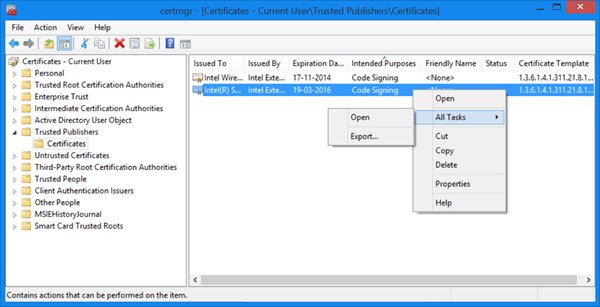Manage certificates using Certificate Manager or Certmgr.msc
The Certificates Manager Console is a part of the Microsoft Management Console in Windows 10/8/7. The MMC contains various tools that can be used for managing and maintenance functions. As mentioned earlier, using certmgr.msc you can view your certificates as well as modify, import, export, delete or request new ones. To manage your certificates, from the WinX Menu in Windows, select Run. Type certmgr.msc in the Run box and hit Enter. Remember, you will have to be logged on as an administrator. The Certificate Manager will open. You will see that all the Certificates are stored in various folders under Certificates – Current User. When you open any certificates folder, you will see that the certificates are displayed in the right pane. In the right pane, you will see columns like Issued To, Issued By, Expiration date, Intended Purpose, Friendly Name, Status and Certificate Template. The Intended Purposes column tells you what each certificate is used for.
Using the Certificate Manager, you can request a new certificate with the same key or a different key. You can also export or import a certificate. To carry out any action, select the certificate, click the Action menu > All Tasks, and then click the required action command. You can also right-click on the context menu to carry out these actions. In case you wish to export or import certificates, an easy-to-follow wizard will open which will take you through the required steps.
It is to be noted that Certmgr.msc is a Microsoft Management Console snap-in whereas Certmgr.exe is a command-line utility. If you want to learn about the command-line options in certmgr.exe you can visit MSDN. Read this if you receive There is a problem with this website’s security certificate in IE message.
